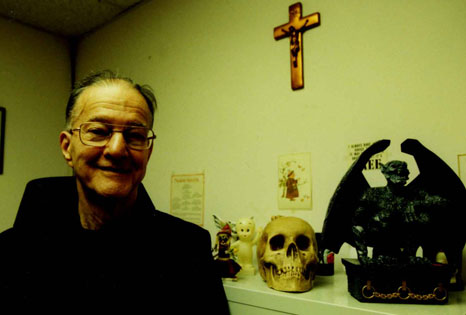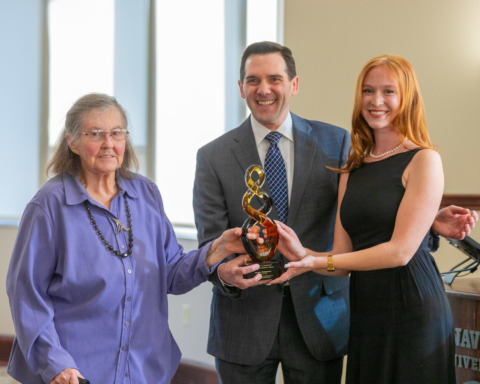By Heather Monahan
Features Assignment Editor
In this day and age, it’s rare to find a college student who isn’t on Twitter. However, with its multiple functions, more professors are joining the site as well.
Jim Mahar (@BonaResponds), associate professor of finance and BonaResponds coordinator, said he joined Twitter in 2008.
“I joined early on in the process,” Mahar said. “I started it for BonaResponds because when we’re at a site, I want to be able to talk with a bunch of people at once. It was before the age of group texting.”
Since he’s joined, Mahar said Twitter has helped BonaResponds with many of its projects.
“Whenever I need something, that’s the first place I go,” he said. “I put it out there, and let the powers that be work, and all of a sudden, there’s what we need. It works remarkably well.”
Although Mahar originally joined Twitter to promote BonaResponds and contact those involved, he said he now has multiple accounts for his classes.
“We post notes and videos there (on Twitter) for SIMM,” he said. “In other classes, there seems to be a reluctance to jump in. I have a fan page on Facebook for finance stuff.”
Rich Lee (@RichLeeOnline), assistant professor of journalism and mass communication, also said he’s trying to integrate social media into his classes.
“I had students live-tweet once,” Lee said. “I always tell them, ‘I’m not going to tell you how to use Twitter, but I can tell you how to use it for journalistic purposes, and I’ll give examples of how journalists are using it.’”
Like Mahar, Lee said he was early to Twitter and joined in 2009 because of the benefits the social media platform presented him.
“When I worked with the Think Tank, I wrote a lot of articles and papers that we posted on the website,” he said. “It was a situation where we were promoting the Think Tank, and I was kind of promoting myself so whenever I was on a panel or something like that, I’d put that on Twitter.”
While Lee sees the major benefits of Twitter, he said some people are still hesitant to join.
“A lot of people my age who maybe aren’t into technology that much are so puzzled by Twitter,” Lee said. “They’ll say, ‘How can you get information in under 140 characters?’”
Lee said when he started on Twitter, he was hesitant about interacting with students.
“I was a little reluctant when students followed me,” he said. “I didn’t know if they wanted me following them but a couple of them said, ‘I followed you a few days ago, I’m waiting for the follow back.’ So now if someone follows me, I take that as a sign to just follow back.”
Sara Johnson (@sarajohnsauce), a senior journalism and mass communication major, said she doesn’t follow any professors on Twitter.
“I don’t follow (professors) because I’m genuinely scared they would follow me back,” Johnson said. “Twitter is strictly personal for me and not professional. I can’t say all of my tweets would make my professors proud.”
While she doesn’t interact with any of her professors on Twitter, Johnson generally has a positive attitude about the idea.
“I think (having) professors on Twitter is pretty cool,” she said. “It comes in handy if they want to share a link over the weekend or on a non-class day. They can do it right from their phone and without the hassle of Moodle.”
Despite classifying her Twitter as a personal account, Johnson said she still considers Facebook more private.
“On Facebook, a professor has to accept your friend request, and they might decline because it becomes a lot more personal,” she said.
Jerry Godbout (@jtgodbout), chair of the chemistry department, agreed about how intrusive Facebook can be.
“With the nature of Twitter, it can be far less personal than someone’s Facebook profile,” Godbout said. “I’d say it (seeing tweets) is a bit different than students seeing pictures of my last vacation.”
While Godbout said he hasn’t yet found a way to use Twitter in his courses, he isn’t opposed to the idea.
“I’ve thought about that and I actually haven’t come up with an idea of how that would actually bring something new to the experience that would be worthwhile,” he said. “But right now in my syllabus I have a policy against tweeting during class.”
Kyle Jose, a junior sports studies major, said while Twitter is not integrated into any of his courses, he thinks it’s a good tool if used correctly.
“I feel that (having) professors on Twitter can be useful for obtaining course information as well as learning about the professor,” Jose said. “Twitter allows for more expression as well as information due to its quick posting procedure.”
While students and professors use Twitter in multiple different ways, connecting professors and students on social media seems to be a new experience for all involved.






